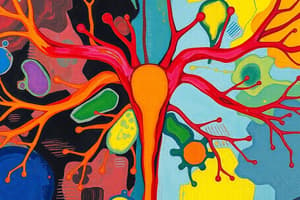Podcast
Questions and Answers
What is the primary purpose of general knowledge quizzes?
What is the primary purpose of general knowledge quizzes?
- To assess individuals' ability to apply concepts
- To measure individuals' creativity and critical thinking skills
- To evaluate individuals' overall knowledge across diverse topics (correct)
- To test individuals' knowledge on a specific subject
Which type of questions originate from individuals' personal interests or hobbies?
Which type of questions originate from individuals' personal interests or hobbies?
- Test questions
- Curiosity-driven questions (correct)
- General knowledge quiz questions
- Survey questions
In what context might someone ask a question about photography techniques?
In what context might someone ask a question about photography techniques?
- In a science class
- During a quiz show competition
- In a history lecture
- While exploring ways to capture images (correct)
Which activity might prompt an individual to seek more information about astrology signs?
Which activity might prompt an individual to seek more information about astrology signs?
What do test questions typically require students to do?
What do test questions typically require students to do?
What is the primary purpose of incorporating randomized problems in teaching?
What is the primary purpose of incorporating randomized problems in teaching?
How do random questions benefit education according to the text?
How do random questions benefit education according to the text?
Which aspect of life is NOT mentioned as being impacted by random questions in the text?
Which aspect of life is NOT mentioned as being impacted by random questions in the text?
How can random questions aid in problem-solving development based on the text?
How can random questions aid in problem-solving development based on the text?
What role do random questions play in debates and discussions?
What role do random questions play in debates and discussions?
Flashcards are hidden until you start studying
Study Notes
Random Questions
Random questions can refer to any set of questions that are not specifically intended to form a specific pattern or structure, such as those used in surveys or tests. They may simply arise from curiosity or out of a desire to learn more about a particular subject. In this case, we will explore various types of random questions and their uses.
Types of Random Questions
General Knowledge Quizzes
General knowledge quizzes consist of random sets of questions covering a wide range of subjects, including history, science, geography, and popular culture. These quizzes often aim to test the overall knowledge of individuals by presenting them with diverse topics and varying levels of difficulty. Popular examples include trivia games on television shows like "Jeopardy!" and online platforms like Kahoot!.
Curiosity-Driven Questions
Curiosity-driven questions come from individuals' personal interests, hobbies, or areas they want to learn more about. For instance, someone might ask a question related to photography techniques while exploring different methods for capturing images. Alternatively, a person could have a desire to learn more about astrology signs after hearing about it from friends. Such questions stem from ones' inherent curiosity and thirst for knowledge.
Test Questions
Test questions involve setting up scenarios where students must answer questions based on the material taught in class. Teachers may incorporate randomized problems to ensure their students have understood the coursework effectively. This approach allows educators to assess student comprehension without relying solely on memorization or rote learning.
Uses of Random Questions
Entertainment
Random questions are frequently used for entertainment purposes, particularly during social gatherings or events. For example, party games like 20 Questions can bring people together through shared laughter and competition. In addition to providing enjoyment, these activities help build connections and foster a sense of community among participants.
Learning
In the context of education, random questions serve as tools for evaluating students' understanding of subject matter. By asking unpredictable questions, teachers can measure students' mastery over a broad spectrum of content rather than focusing on specific topics. Furthermore, using random questions promotes critical thinking skills, as students must analyze information and apply concepts in various ways.
Problem-Solving
Random questions can also help cultivate problem-solving abilities, whether through general knowledge quizzes, puzzles, or brain teasers. Through practice and exposure to various scenarios, individuals develop the mental flexibility to adapt and find solutions in different contexts.
Debate and Discussion
During debates and discussions, random questions can stimulate thoughtful conversation and encourage participants to consider multiple perspectives. By asking unexpected questions, individuals can challenge their own beliefs and assumptions while deepening their understanding of the topic at hand.
In conclusion, random questions play a crucial role in various aspects of life, from entertainment to education and problem-solving. By embracing the unpredictability of these questions, we open ourselves up to new experiences, learnings, and opportunities for growth.
Studying That Suits You
Use AI to generate personalized quizzes and flashcards to suit your learning preferences.


